|
|
|
Sort Order |
|
|
|
Items / Page
|
|
|
|
|
|
|
| Srl | Item |
| 1 |
ID:
164829
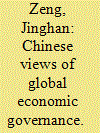

|
|
|
|
|
| Summary/Abstract |
China’s rise and America’s global retreat have made China’s role in global governance more important than ever before. By analysing Chinese (mainly academic) literature, this article studies contemporary Chinese views of global economic governance. It finds that the 2008 financial crisis is a notable point of the Chinese discourse. In addition, dialogue platforms – the G20 in particular – rather than key institutions of global economic governance such as International Monetary Fund (IMF), World Bank and Word Trade Organization (WTO) win overwhelming attention in the Chinese discourse. Chinese views of global economic governance also highly value the role of the state, while paying less attention to Non Governmental Organisations (NGO) and civil society. Overall, this article highlights a diverse, shifting and sometimes contradictory Chinese discourse on global economic governance, which helps to develop a more accurate understanding of China’s ambition in global economic governance.
|
|
|
|
|
|
|
|
|
|
|
|
|
|
|
|
| 2 |
ID:
164823
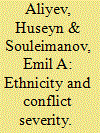

|
|
|
|
|
| Summary/Abstract |
How does the presence of armed pro-regime groups affect conflict lethality? This study examines the relationship between ethnicity, militia violence and conflict lethality in civil wars. We emphasise that differences in whether pro-regime militias were recruited in accordance with their ethnicity or not are critical in their influence upon conflict lethality, which we estimate in battlefield deaths. To that end, we categorise militias into groups recruited on their ethnic basis (co-ethnic militias) and those recruited regardless of their ethnicity (non-ethnic militias). We hypothesise that conflicts are more lethal when non-ethnic militias are involved. We link higher number of battle-deaths in conflicts with non-ethnic militias with the militia use of one-sided violence against civilians. Co-ethnic militias – that is militias recruited from the same ethnicity as rebels – are deployed amongst their co-ethnics and therefore tend to target civilians less than non-ethnic militias. This militia–civilian relationship has direct impact on conflict severity. To test our hypotheses we conduct global statistical analysis of 84 intrastate conflicts from 1989 to 2014.
|
|
|
|
|
|
|
|
|
|
|
|
|
|
|
|
| 3 |
ID:
164825
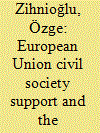

|
|
|
|
|
| Summary/Abstract |
Despite growing critical literature on external funding, the link between EU funding to Turkish civil society organisations (CSOs) and their depoliticisation remains understudied. This article fills this gap. This article explores EU funds in Turkey and shows the incentives it creates for a depoliticised civil society. Drawing on an original set of interviews with 45 CSOs, this article analyses how Turkish CSOs interact with EU funding and how this support impacts on Turkish civil society. This article argues that EU funding’s short-term, activity-based, measurable outcome and visibility-oriented structure contributed to the depoliticisation of those CSOs benefited from EU funds.
|
|
|
|
|
|
|
|
|
|
|
|
|
|
|
|
| 4 |
ID:
164831


|
|
|
|
|
| Summary/Abstract |
This article is part of a larger project that focuses in part on the migration dynamics in large Mexican metropolitan areas or globalising cities. In particular, it develops a comparative analysis of the urbanised region of Puebla-Tlaxcala, the metropolis of Monterrey and Tijuana. All three metropolitan areas are important industrial centres that attract rural–urban as well as interstate migrations. Moreover, these urban centres are situated at routes used by migrants from Central and South America to get to the US. Yet, despite the increasing impact of migration(s) on urban areas, very little is known about its characteristics and municipal authorities have not identified inward or transmigration as issues of political importance. For our analysis we intend to map the different migrations through addressing the following question: How are migrations transforming the urban areas of Monterrey, Tijuana and Puebla-Tlaxcala and how are they inserted in and contributing to urban assemblages in these metropolitan zones? For this particular article we have chosen three distinct migratory groups to contrast: Germans in Puebla-Tlaxcala, Haitians in Tijuana and Indigenous populations in Monterrey.
|
|
|
|
|
|
|
|
|
|
|
|
|
|
|
|
| 5 |
ID:
164821
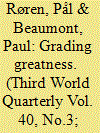

|
|
|
|
|
| Summary/Abstract |
An impressive portfolio of case-study research has now demonstrated how and through what means the BRICS (Brazil, Russia, India, China, South Africa) countries have sought higher social status. However, this field of research lacks systematic means of evaluating this status-seeking. This article fills this lacuna by developing a mixed-methods framework enabling scholars to zoom in and compare individual states’ relative status performance. Using diplomatic representation as a proxy for status recognition and comparing it to a country’s status resources (wealth), the framework indicates how successfully countries have generated recognition from the international society. The findings show that China’s economic ascent has been matched by increased recognition, and that South Africa enjoyed an almost immediate ‘status bounce’ following apartheid, turning it from a pariah to a significant overperformer. Russia should be understood as an ‘overperforming status-dissatisfied power’ while India’s status performance has been around ‘par’ for a country of its economic resources. Lastly, Brazil underperforms more than any of the other BRICS, especially since its democratic transition. The findings highlight considerable variance in the type and duration of gaps between status resource and recognition and suggests that rather than treating these as ‘inconsistencies’ awaiting correction, they can and should be accounted for by case study analyses.
|
|
|
|
|
|
|
|
|
|
|
|
|
|
|
|
| 6 |
ID:
164824
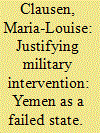

|
|
|
|
|
| Summary/Abstract |
The Saudi-led military intervention into Yemen began on 26 March 2015, and it has largely been supported by the international community despite resulting in the world’s largest current humanitarian disaster. The paper explores the emergence of the failed state concept, particularly as it has impacted the norm of sovereignty. It shows how being defined as a failed state can undermine the norm of sovereignty. This article argues that Saudi Arabia has utilised the failed state concept to legitimise its military intervention into Yemen by framing the intervention as necessary to establish a strong executive power and protect the Yemeni people.
|
|
|
|
|
|
|
|
|
|
|
|
|
|
|
|
| 7 |
ID:
164828
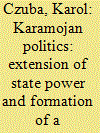

|
|
|
|
|
| Summary/Abstract |
State-making processes that occur in peripheral areas and the role that local political elites play in such processes have not been adequately explored by scholars. This article investigates these important phenomena through the lens of the Ugandan state’s presence in Karamoja, in the country’s northeast, which until the early years of the twenty-first century was very limited. Rapid extension of the power of the Ugandan state in the region, upon which the country’s rulers have embarked in the last decade, has radically altered existing governance arrangements in Karamoja and led to the formation of a subordinate Karamojan political elite. This elite has been instrumental in government efforts to establish control over the region’s population and shaped this state-making process in important ways.
|
|
|
|
|
|
|
|
|
|
|
|
|
|
|
|
| 8 |
ID:
164826


|
|
|
|
|
| Summary/Abstract |
In this article, we draw on the contradictions in, and the geopolitics of, international election observation in the Democratic Republic of the Congo’s 2006 and 2011 elections to identify and analyse the emergence of a neo-third world behaviour among African states intended to counter the excesses of Western liberal democracy promotion on the continent. We argue that the decision by African states to quickly endorse the 2011 elections and close ranks around Joseph Kabila’s government, amidst mounting international criticisms of the electoral process, should be understood in the context of a new form of third worldism that is emerging in the global South in response to the unrestrained exercise of US power.
|
|
|
|
|
|
|
|
|
|
|
|
|
|
|
|
| 9 |
ID:
164822


|
|
|
|
|
| Summary/Abstract |
The evidence of regional authoritarian clustering across different world regions goes together with the finding that after the end of the bipolar world regional patterns of interaction became more important. Especially in the 2000s a process of revitalisation of regional organisations and even the creation of new regional organisations took place. Interestingly, these newly founded organisations consist predominantly of authoritarian regimes. Due to the emergence and resilience of authoritarianism in the world, the question arises: To what extent do regional organisations (ROs) play a role in this phenomenon? We argue that authoritarian protagonists which we call authoritarian gravity centres (AGCs) constitute a force of attraction for countries in geopolitical proximity – and use ROs as a transmission belt and a learning room for disseminating autocratic elements. In a cross-regional comparison, based on extensive field work, we provide empirical analysis on two AGCs (Saudi Arabia and Venezuela) within their respective ROs Gulf Cooperation Council (GCC), Bolivarian Alliance for the Peoples of Our America (ALBA-TCP) and tackle the questions of why and how autocracies decide to move forward multilaterally within the RO.
|
|
|
|
|
|
|
|
|
|
|
|
|
|
|
|
| 10 |
ID:
164827


|
|
|
|
|
| Summary/Abstract |
Ethiopia experienced a critical juncture in 1991 with the defeat of the military dictatorship, opening up the possibilities of a new political order. Since then the country underwent social engineering and institutional transformation emerging as a leading reformist state under hegemonic-party rule with high institutional state capacity but also a concentration, and even personalisation, of decision-making power. This approximates to a path of ‘authoritarian institutionalisation’. This article argues that Ethiopia’s institutional trajectory can be explained by the nature of coalition politics in the formative years of transition, specifically the extent to which credible challengers were excluded from transitional processes. The strategy of excluding Pan-Ethiopian parties and sideling the Oromo Liberation Front (OLF) set the country on the path of establishing a hegemonic rule by the Ethiopian People’s Revolutionary Democratic Front (EPRDF). Sustaining hegemonic rule entailed fending off threats from excluded groups in the 1990s but which coalesced into a strong electoral performance in the 2005 elections in whose aftermath the ruling party embarked on aggressive pursuit of state-directed development for political legitimation.
|
|
|
|
|
|
|
|
|
|
|
|
|
|
|
|
| 11 |
ID:
164830


|
|
|
|
|
| Summary/Abstract |
Despite global pressure and national security concerns, the efforts of the Government of Pakistan to reform the madrassah system have proven to be futile. Extant literature on madrassah reform challenges relies overwhelmingly on information provided by governments and experts situated outside of these institutions. While these studies and reports present important findings and viable analysis on madrassah systems; most of the research fails to give voice to the major stakeholders of this system itself, such as the administration staff, teachers, students and parents. Our study fills this crucial gap by conducting semi-structured interviews and field observations inside Pakistani madaris (plural for madrassah) and their professional associations. We find that these madaris have been reluctant to participate in policy interventions offered by the government due to a major trust deficit brought on by differences over financial and curriculum regulation, degree recognition and the government’s role in shaping popular perceptions about madaris. This reluctance has turned down attempts for madrassah reformation and has in turn made them vulnerable to radicalisation. We conclude with policy recommendations for more effective government reforms and a stronger relationship between madrassah representatives and the Government of Pakistan.
|
|
|
|
|
|
|
|
|
|
|
|
|
|
|
|
|
|
|
|
|